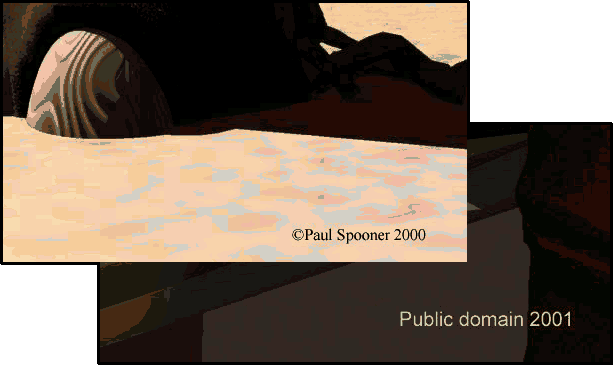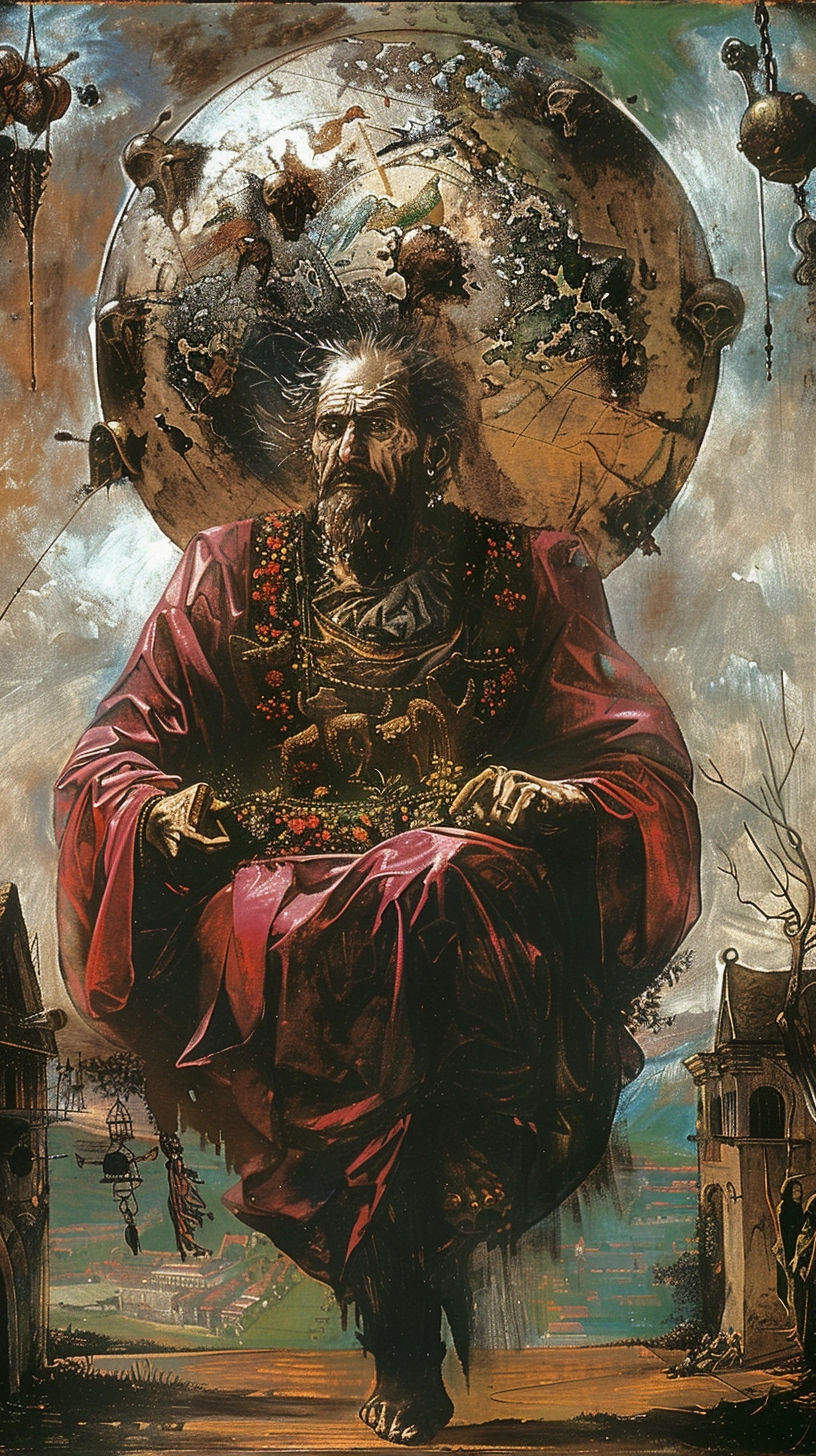



The below is all very big talk, and talk is (both by popular consent as well as the proof I have endeavored to offer below) cheap. But as far as talk may take us, let us boldly go:
I, Paul Daniel Spooner, born 1984-01-11, on this the fifth of August, the Year of Our Lord two thousand and fourteen (2014-08-05) hereby release the entirety of my intellectual property to the public domain. All ideas which I have produced in the past, or will produce in the future, I hereby make available for the free and unrestricted use by all people for all time. I explicitly forbid any entity, regardless of merit, standing, or interest, from restricting the free and unaltered dissemination of any information which falls under my authority. Anyone may use, employ, adapt, and/or transform any concept I have produced for any purpose without fear of retribution or litigation originating from myself.
If you have comments or feedback, feel free to leave it here. If you'd like to commission a custom 3D model, I can help you with that.
To people everywhere, and those especially who ponder excellence:
Ideas can’t be stolen, they can only be made real.
Herein I seek to demonstrate the idea of “intellectual property” is childish, false, and wicked.
I may also delve a bit into some implications (such as that the ideas of Copyright, Patent, and other forms of mental slavery should be universally rejected on every level). But first, a little bit of my…
When I was a child myself, I clung (as do so many children) to many absurd notions. (I also found some true ones, but the point is that a child’s intuition (even at the best?) needs be examined.) Among my disparate assumptions was this concept of intellectual property, or, as a child would have it, “I thought of it first”. I must say, even as a child, this idea, couched in these selfish terms, repulsed me. I believed that there existed some right of an ideas originator to the products of the ideas implementation, but yelling “I thought of it first!” at one-another was too trite even for me-from-the-past. What good methods and alternatives there were I did not know, but I assumed (with the ignorance and blindness of a child) that there was some civilized method of expressing this concept, and that, as an adult, I would enjoy the privilege and the fruits of my intellectual labor under the protection of the law from all who dared to “steal my ideas.”

Some examples of images I copyrighted, or refused to do so. Not that anyone would want to infringe on this stuff.
As I grew, perhaps in my mid-teens (I have kept no journal of my ideas progression, as the results seemed more important than the process at the time) I began to grow in knowledge of the specificities of these social implementations, namely the Patent and the Copyright (with their many other names denoting subtle shades of seperation). I also began to produce such works which could fall under the protection of these systems. I began to put copyright marks on some of the images that I made. This practice spurred me to work through a few implications. None of these systems assured me good return for “good ideas” which I formed. Rather they all, uniformly, worked to actively deny all people use and profit from the things I thought up, in hopes that I would grant such rights when satisfied by compensation. This sat with me uneasily, and I resolved, as much as was within my power, to produce materials that everyone could use and spread free from restrictions. I still believed that IP was “a real thing”, but it now resided in the “kind of a jerk move” region of my conciousness. However, I still assumed that I would, one day, produce a grand idea (either of fiction or practical genius) so profound that I could justify procurement and defense of “my rights” to the idea and its outcomes. Thus, concurrent with my experiments with copyrights, I also left my works un-marked, or even occasionally labeled them with public domain declarations.
As adulthood flourished beside wisdom, so did discussion of these topics on the Internet. Even though I bore some interest in the outcome, I never sought out or quarreled in such hot debates, preferring then to meditate myself on pure ideas, and arrive at some conclusions all my own. Once I had a reasoned stance, I then assured myself, I would go out into the Internet and test it with the arguments of betters than myself. As I have arrived at such conclusions, I have likewise done so. The results are nearly what I could have guessed: I seem to have arrived (surprise surprise!) at similar conclusions to those of Richard Stallman, Lawrence Lessig, and the many other libertarian philosophers who likewise thought upon these topics. In summary:
“IP” is vicious moonshine.
(not to be confused with “viscous moonshine” which is an entirely separate (though similarly distressing) concept)
This confirmation is a mixed reward, for though I joy in ruminations thus confirmed by those much better than myself, I also am a maker of such products which would normally fall under the “protection” of the IP laws. Thus, by making this my stance, I also alienate myself from the socially approved means of procuring compensation for my labors of the mind. I will explore these implications a little later on, but first I will endeavor to disclose the argument itself which so convinced me that this paupering course is the only one which may be walked with justice at my side. Although these statements have, no doubt, been made both first and better elsewhere, I ask you entertain my own ruminations on this topic of…
Property, the concept, is both old and lovely. It implies that there are many objects, some of which are scarce and difficult to find and form, and that the makers or seekers of such objects have the right to hold or give them as they wish. It also broadly praises trade (the non-coerced exchange of property) and piles contempt on theft (coercion in the place of trade). Property is one of the most widespread and successful social concepts, and it pre-exists all known society and indeed all language.
Language, in itself, brings up an interesting point. While the property (the objects of themselves) may be both rare and valuable, everyone who comes in contact with propery (either of their own or that of others) makes a copy of it in their mind, as a part of the experience of observing it. Language allows the nearly effortless transmission of these ideas, which in turn allows others to produce or locate similarly lovely objects and thereby multiply good in the world. We see therefore that freedom of ideas increases wealth for all. Stealing property deprives the owner of the property, where “stealing” ideas deprives the originator of nothing tangible.
On its face, the meaning of Intellectual Property is that a person who composes a specific concept has the right to dictate who makes a copy of this idea, and especially what persons implement it into practice. But here we are presented with several problems. If, by our communicating an idea, we permit all others to make copies of it, it would seem to follow that the surest way to stop this replication is to never tell others about it (and forget it yourself as quickly as possible). This is counter-productive, as no one will pay for an idea they have never heard of, and once they have heard it, it is quite impossible to control their ability to disseminate the idea freely, short of using force upon their body. Ruling out (for reasons which (I hope) are obvious) democide, it appears that intellectual property is a self-defeating idea. Those who would enforce it would be better served by secrecy. And, indeed, one presented purpose for the patent laws was thus to aid the spread of such ideas which would normally be hidden far from view, and even lost as time went on. But because (in actual practice) most truly revolutionary concepts are not patented (or at least not successfully by common measure), we see that practice quite agrees with theory in this matter.
But there is a great deal of stock put in this idea, so it must not be this simple. And, indeed, it is more complicated than what I present above.

The design is M.C. Escher’s, recorded in the woodcut “Tetrehedral Planetoid”. He’s long dead, but the original is still under copyright. I made this 3d model as a result of a careful study of a copy of his original, but is the model mine? Or his? Or someone else’s?
When a person experiences an object (either of practical use, or of artistic beauty) their internal copy of this object is not perfect. It is so far from perfect that if one were to attempt a re-creation from raw memory, the resulting product would (most likely) yield the barest of resemblance to the intended original. However, with time, effort, study, and skill, one might craft such a well formed copy that it would be difficult to distinguish from the original. We call this process of intentionally producing an object indistinguishable from a work deemed to be the Intellectual Property of others “forgery.” And thus we see the reason why the IP laws are so enforced despite their flaws, as they are necessary for existence of symbolic currencies (such as are in use by nearly all the globe as I am writing this).
Thus, it becomes clear that IP can not halt production of all copies of a concept, but only the copies of high quality such as could be judged as forgeries. In the past, such forgeries were highly time consuming to produce, and always somewhat flawed. However, with the advent of the many various and cheap technologies (computers and the Internet are chief among them), such copies of a works are trivial to make, disseminate, and transmit, to such degree that many works may be objectively indistinguishable from the intentional copies used for distribution. Thus we see that all digital transmission of works protected as Intellectual Property is, in principle, a forgery.
Along with such technologies there have arisen means to poison works so that they need an antidote to be employed for useful purpose, commonly termed DRM (Digital Rights Management), and just as commonly derided.
With such basics set in order please allow me to present a…
As with every stance, this argument rests on several assumptions and definitions. Mine are as follows:
These two assumptions are, I think, quite reasonable and unoffensive to the vast majority of humanity. And from these it follows that the idea “intellectual property” is a bad one. If the connection is not evident to you, please…
The idea of IP has only power to prevent the spread and implementation of other ideas. Its purpose is to limit good ideas (since no one would deign to sell bad ideas) in order to extract a price from those who would, otherwise, freely implement such good ideas and thereby benefit from their results.
This directly results in less happiness for humanity, both in the present and the future, and therefore is bad (see assumption 1 above). Since the result of implementing IP is bad, the idea itself is also bad (see 2 above).
In addition, if the good ideas are constrained, people are then left to use the lesser ones. Effort that would normally result in good production is diverted into poorer channels, further robbing people of the benefit of turning good ideas into practice. Thus the limitation of the spread of good ideas and the action taken on them both detract from human happiness and are a clear and present evil in the world.
One may argue that IP may be used to limit the spread of bad ideas, thus increasing the net happiness for all. However, if an idea is bad, it is best prevented by disseminating information about the evil results along with the idea itself. Such ideas (telling of results of other carefully implemented ideas) is broadly termed “science”, and is itself quite strangled by this IP concept. The “Web of Knowledge”, scientific journals, and the like all exist to keep the spread of scienctific knowledge to the bare minimum necessary. We should be freely distributing the results of scientific investigations, not squirreling them away. Thus, this purported advantage turns out to result in further condemnation of IP.
One may also argue that, though IP may limit the spread of good ideas, it does so to the advantage of those who create such good ideas. May I simply point out (though I hesitate to do so, as it seems to insult the intelligence of my readers) that such an argument equates to the “needs of the few outweigh the needs of the many” and thus if it is not repulsive to your conscience, I despair of attempting to convince you otherwise.
One may further try to justify this practice by proposing that IP encourages production of more good ideas, thus resulting in a net gain for everyone. This I can not directly contradict (and nor can you directly prove), but I hope it is as evident to you as to myself that, far from encouraging innovation, the practice of IP has had the opposite effect, resulting (wherever it is employed) in the stagnation of creativity, the fallow dis-use of otherwise profitable concepts, and the expense of much effort to the purpose of actively thwarting implementation and dissemination of good ideas, all for the profit of a very few at the cost of detriment to all.
Thus, it seems to be that Intellectual Property is conceived by childishness, perpetrated by dis-information, lies, and greed, and useful only for the wicked advantage of the few over the many.

Hundreds view this image every month, and about a quarter download the free 3d model. I have never demanded any compensation for the work that went into making it, and hopefully never will.
But, as much as I would love to exult in this result, it is (as I have hinted formerly) a rather Pyrrhic victory. For, though I delight in the simplicity and power of the case I have presented, it also means that I can never look to society and demand compensation for my intellectual labors without violating my own stated principles. This is especially problematic for me, as a creator, since I work in a broad range of mediums, many of them digital. It seems to put to rest the notion that I could ever find real employment as a creative individual, or indeed accept employment at a company which depends on the IP laws for their existence.
However, this conundrum is not without a minuscule ray of hope. Although I can not demand compensation, or even ask that you cease to distribute “my” ideas, there does appear an alternative. If Intellectual Property (which I reject) is a doctrine of coercion, then I…
Though ideas should not be restricted after their formulation (because such restriction is (as outlined above) either an act of malice, or admission of deceit) their creators may certainly be paid for the labor of creating them. Whether this price is paid beforehand, or simply agreed to, it is both civil and free from undue restraint by the law. This is the time-worn idea of a commission, and will stand quite well without the artificial props of IP. Such compensation has the advantage (to the consumer) of being limited, as creative persons are paid a limited amount, not the unlimited rewards which current IP laws afford them. This comes with a corresponding advantage (this time to the producer) of requiring trust. The creator may fail to produce a work which merits payment, and the one who pays has no guarantee of satisfaction.
Still, this state of affairs is infinitely superior to granting arbitrary persons who “thought of it first” the right to extort all persons in the future for an indeterminate amount of both time and resources as backed by the violent force of the state.
Thus I ask that you, noble reader, and of your own free will, do consent to support my intellectual efforts, not because I force you, but because it constitutes a beneficial trade for both of us. Conversely, if you are unable or unwilling to contribute, please know that I bear you no ill will and urge you most strongly to enjoy what I produce freely without charge or guilt.
Of course, I would somewhat prefer to call on the State to strong-arm anyone who refused to render me what I think is fair and reasonable, which is why I now make…
I beg you, noble reader, if you have any way to convince me otherwise, that you bend your powers to do so. If you know of a way to safely arrive at confirmation of Intellectual Property, both as an idea and a practice, which affirms it as worthy for those of sound mind to practice upon their peers through the use of violent force, I beg of you to make the case… and strongly too! If you have heard even hint of such truths which will enable me to demand (along with rights to individual property) the rights to ideas which I “produce”, I plead with you to tell me of them without delay. As it is, I can not conceive in my current state of mind that such arguments would even exist, let alone be convincing. These conclusions appear to me so inescapable that I find no alternative, actual or hypothetical, which I may at once approve and keep my conscience clean.
As to matters larger than my own personal concerns, I suspect this problematic idea of Intellectual Property surpasses law, and to uproot it will require…
As long as the idea of Intellectual Property is considered a valid viewpoint at large in the world, our laws and practices will continue to support monopoly and coercion. It is only by absolutely rejecting this concept as evil and childish that we will be able to move forward as a culture and a species, and adopt more fully notions of cooperation and learning which are now so crucial to our burgeoning enlightenment.
We need to stop thinking foolishly. Ideas are not property. Ideas can not be stolen. The hardest part of developing good ideas is not their conception, but their implementation and testing, and the social structures and physical artifacts used to carry out this task are the same as can be used to manufacture the results of good ideas, thus amply rewarding innovators.
There is no useful purpose for this nonsense notion of intellectual property, and we should abolish it as quickly and painlessly as possible.
It brings me no pleasure to point out that, as far as adopting these views on Intellectual Property, Brazil, Russia, India, and China are far ahead of the nations of North America and Europe. While I can by no means condone all of the policies of these nations, I must point out that, in this matter at least, “their” cultures appear to be superior to “ours”. I can only hope that with the rising relevance of these nations (and the cultural mindsets they represent) will come an equal irrelevance of IP laws and enforcement.

A hopeful sunrise over the Pacific
Thank you for considering my arguments. I hope that, whatever your stance and actions, I have stimulated your mind on this matter. And, as I said above, if you have any compelling refutations to these principles, I am eager to adopt them, as it will produce means for my own enrichment, and the enrichment of those of whom I approve.
Sincerely,
Paul Spooner
From here on all the images on this page were created with the Midjourney AI model. If you’re interested in reading even more, here are a few thoughts on...
I endeavor below to perform an exhaustive topical study of the matter of IP in the Holy Scriptures, but first, here are my own brief recollections and wanderings through the scriptures, along with some comments.
I have already endeavored to examine (and dismantle) the logical foundations of the idea of Intellectual Property, but before this writing the religious justification or refutation has gone largely untouched.
For this study I will be sourcing exclusively from the KJV translation of the Bible, which you can download for free here. I will be referencing by book and chapter only, and will quote sparing context, as the full text is available and searchable.
But first, I feel it is healthy to address a few of the…
Exodus 20 is often quoted as evidence for the validity of IP. However, this argument presumes both that ideas are property and can be stolen. I would say that neither are true, but either way this passage does not enlighten us on the definition of theft. It does, however, bring up a much more interesting point which I will go into further on, as regards both dishonesty and covetousness.
Romans 13 is another common evidence offered, specifically that if the government disapproves of something, it is wrong. However, the passage clearly states things the other way around. If something is right, the government will approve. Far from justifying IP (or any other injustice), this further encourages us to determine and do what is good without fear of the government.
Ephesians 4 is commonly used as another injunction (from the New Testament this time) to not steal, and has the same shortcomings as the Exodus 20 passage, but with an added benefit. It offers an implicit definition of theft! To do good things with one’s hands is offered as the opposite of theft, which has interesting implications. If anything, this too will brace against IP, as demonstrated below.
Of these three preliminaries, two beg the questions of what the Bible says about theft and the mind… So let’s explore that.
The scriptures do not contain what we would ordinarily recognize as a dictionary. However, the poetic form of much of the old testament is that of similar concepts. In this poetry, like ideas are paired, and dislike ideas are contrasted. Therefore, the books of Job, Psalms and Proverbs may be used to discern the association of various terms. Fortunately, there is a passage in each of these books which speaks to theft:
So we see that the scriptures mean by “robbery” the oppressive acquisition of wealth which belongs to another. If perhaps these passages alone do not convince you, peruse the below for further indications of the meaning of theft in the Bible.

So much for the general passages on theft. All have to do with physical goods, and none imply copying ideas or representations are in any way associated with theft. Now for a few passages that I found particularly interesting.
The first is from the Old Testament prophets:
This passage in Jeremiah seems to be dealing with words under the act of stealing! Very pertinent. There are three ways I can see this being interpreted. It is talking about:
As interesting as these distinctions are, they mean the same thing for the purposes of our investigation. This passage says that it is stealing when a prophet takes God’s Word away from his neighbors. Put more generally, stealing is preventing ideas (“my words”) produced by party A (“the LORD”) from reaching or being held by party B (“his neighbor”). This is the exact opposite of normal IP phrasing, where “stealing” would be copying ideas from party A and distributing them to party B without compensating party A. So we see in one of the very few cases where the Bible treats ideas as a subject for theft, the example runs exactly against the practice of IP.
Now let’s move to a New Testament example, and something a bit more concrete:
Here we have a classic case of defamation which touches very near the heart of the issues of intellectual property. Sculptors are upset because their trade is being devalued by the doctrines of Paul. It is more a case of slander (here written “blasphemers”) than infringement, yet we see that the city official dismisses even this charge. It seems that even loss of profit does not amount to either theft or defamation. As IP concepts are so often championed on the grounds of avoiding lost profit, this seems significant.
Finally, we have three utterances by our Lord Himself, which I will attempt to explore with the proper respect:
This is the first and only passage which I could find that indicated theft not by the outcome, but by the method of execution. The thief and robber is marked not by taking what belongs to another, but by the method whereby he approaches others possessions. Of course, in the same chapter the thief’s goals are revealed. So we see by this passage that – to the owner of the sheep at least – theft, slaughter, and destruction are all the purview of the thief. It seems that the important part is not that the thief gains possession, but rather that the original owner does not retain possession. This goes, I believe, to the heart of the matter.
Here too Jesus, blessed be His name for His excellent righteousness and love toward us, I say our Lord stresses that decay and theft have similar outcomes, as they take away from the owner. It is better to lay stock in what can not be taken from us.
I mention too that a great many of the passages on theft which I have omitted are directions to not steal and lie. It does seem significant that lying and false witness are mentioned so often adjacent in the scriptures, but I would attribute this to their clear distinction of subjects, rather than a shared one. Stealing is lying about ownership of physical goods, and lying is stealing the understanding of truth. However, as these passages do little to enlighten our understanding of the terminology, I pass over them for now.
So it seems that the idea of “Intellectual property” is nowhere presented in the present popular conception. A proof by omission is, of course, nearly impossible, so I do not place undue weight on this. Instead I observe that the region associated with theft is wealth, and then move to an examination of the intellect itself, to see if we can find traces of ownership (and therefore the capacity for theft) in such regions.
This is a vast topic, and I will not attempt an exhaustive examination here. Instead I welcome you to do your own reading while I resort simply to generalities.
From my reading the mind is a place of joy and grief, plans and hopes, good and evil, memory and forgetfulness, of will and determination, of trust and suspicion, pride and humility.
The mind is most often associated with the error of lies and deceit. Nowhere did I encounter even a hint that one could own or steal an idea.

So much for the mind.
To arguments in the vein of “this is how everyone does things these days” I respond with Exodus 23, a short ways after the famous Ten Commandments. IIRC there are many other passages conveying a similar sentiment, especially in writings of The Prophets.
The scriptures also explicitly call for actions which countermand applying IP attitudes to the Bible. For a major example, see Deuteronomy 6 where massive and widespread duplication is not only exonerated, but explicitly commanded. And, of course, the translation of the Bible into various languages (including the English version I used for this research) is an example of this mindset at work. The success of the Bible could be attributed (if Divine factors are set aside) in a large part to a lack of intellectual property restrictions placed on it by its Author (or, if you prefer, authors).
In a not entirely coincidental parallel, Jesus speaks on similar matters in Matthew 5 essentially saying that the spread and practice of (very specific) good ideas is the work of those “great in the kingdom of heaven“.
In contrast, Jesus indicates in Matthew 8 that the beneficiaries of a miracle should not tell anyone except a specific set of officials. While this seems a poor foundation for Intellectual Property as a whole, it is, I think, an interesting observation. It is also interesting to observe that His command is largely ignored.
The apostle Paul, who could have asked for compensation for conveying the special information he received from God, as well as the fruits of his years of meditation on the Scriptures (Galatians 1 and 2), decided not to do so (1 Corinthians 9), instead supporting himself through manual labor and encouraging others to do the same (1 Thessalonians 4). He also recommends that it doesn’t matter how ideas are spread, so long as the idea itself gets out (Philippians 1), which runs counter to the modern concept of approved distribution networks.
For things that really need to keep a secret, the scriptures demonstrate a solution at work in Revelation 10. Specifically, if you don’t want people to know about it, don’t tell anyone; Certainly don’t write it down!
It is simply “a vanity tossed to and fro of them that seek death.”

As far as I can discern, IP is a justification for theft. The practice of Intellectual Property dictates that one person may demand the fruit of the labor of another under the threat of violence. According to all the examples and principles I could find in the Bible, this is oppression and robbery. Worse, it is theft masquerading as the punishment of theft. Therefore, those who uphold this idea are in danger of committing both the errors of stealing and false witness. It is a practice unjust in exercise and unfounded in principle, and thus it is our duty to always and everywhere despise it in whatever form it takes, whether that be copyright, patent, or any other name which thieves give to mask their guilt.
This brings us back to Exodus 20, which illuminates the true motives behind IP; In a word, covetousness. The entire modern idea is a lie founded on envy and used to justify robbery.
Ephesians 4 gives us the alternative, which is to do what is good with our hands. And how do we know what is good? By our own experience, or by emulating the actions of others. So we see that “IP Infringement” far from being theft is instead the solution to theft.
As always, I am interested to hear your feedback on this matter. It may be that I have overlooked a critical passage which bears examination. I doubt that any single evidence may overthrow the weight of the accumulated evidence which I have laid out, but love hopes all things!
God’s blessings on you in your search for truth and justice,
Your servant,
Paul
If, perchance, you still hunger for more thoughts on this topic, may I interest you in a meditation on how...
I've been listening to Jordan Peterson a lot recently. Specifically thinking about the specter of Marxism that he’s afraid will re-assail the world. Here are my thoughts:
There is much in Socialism that is wicked and perverse, and for the greater part I stand with Jordan B Peterson in his rejection of communism, both on the basis of its fruits and of its intellectual bankruptcy. However, there is one (at least) spot in which I have departed from this sage, and in which I find some truth in socialism, and it is in the matter of Intellectual Property.
There would not be any adherence to any system of thought if it did not have some truth in it and – though I cannot claim this is all the truth – there is at least some truth in the idea that there are some goods which should be held in common. Now, what I mean by “goods” are “things that are good” not necessarily physical goods. I think this is where socialism goes dreadfully wrong, is that it is a materialist socialism. I think what we need is an intellectual socialism in the sense that the goods which we should be holding in common are intellectual goods.
My argument boils down to an argument against Intellectual Property, which has been made elsewhere and better by better minds than mine. But I have not seen anywhere this parallel drawn between socialism and Intellectual Property. It keeps leaping out at me! In Dr. Peterson’s lectures. In arguments I hear made in favor of communism. It keeps occurring to me that if socialism is so wrong it should be easy to refute. But it proves uneasy to destroy. And I think this may be the reason; Insofar as the West has accepted the idea of Intellectual Property as being a valid target for the protection of the state it is in opposition to the truth and will always call forth the spectre of Socialism.
Now, I think the socialists are also gravely mistaken – as I said – if their socialism is directed toward material things because it seems the only good which is appropriately – and possibly even – shared in common are those things not physical, ideas and – if we may go so far – spiritual goods. I don’t think spiritual goods need to enter into it, the intellectual is enough for this distinction. Dr. Peterson has said several times that his feeling is that “the academy should reclaim its intellectual property” and I think that is an error on his part, that the intellectual property should be distributed; It should be shared to all. (As an aside, JBP doesn’t actually appear to believe this should mean restricting access. His making his lectures freely available demonstrates that he believes in some other meaning of “Intellectual Property” than the one that has been enshrined in law in the West.)
As the socialist doctrines proclaim “From each according to his ability. To each according to his need.” In phyiscal things this is impossible because when you take a physical good from one they no longer posses it. If you want to give it to someone else, you have to steal it, or at least convince the person to give it up which – in the case of communism especially – often means to slay them so that they no longer have any hold on it. But this does not apply to intellectual goods! Intellectual goods may be given and retained at once; At the same time surrendered and kept.
The doctrines of socialism can apply in a system of Intellectual Property, in the sense that intellectual property can by held in common, can be produced by those best able to produce it, and can be accepted by those in need of accepting it. With physical goods, Bastiat – the economist of France – calls it “plunder”. To take unjustly by force what belongs to another. This is where I see most of the efforts of socialism directed. But if we can transmute the spirit of socialism to apply to the intellectual – and the intellectual only – then I think that we will have achieved a great good.

I’d like to end with a reading from the book of Proverbs Chapter 3. The entire chapter reading can be found at Bible.tryop.com
Withhold not good from them to whom it is due, when it is in the power of thine hand to do it. Say not unto thy neighbour, Go, and come again, and to morrow I will give; when thou hast it by thee. Devise not evil against thy neighbour, seeing he dwelleth securely by thee. Strive not with a man without cause, if he have done thee no harm. Envy thou not the oppressor, and choose none of his ways. For the froward is abomination to the LORD: but his secret is with the righteous. The curse of the LORD is in the house of the wicked: but he blesseth the habitation of the just. Surely he scorneth the scorners: but he giveth grace unto the lowly. The wise shall inherit glory: but shame shall be the promotion of fools.
Proverbs Chapter 3